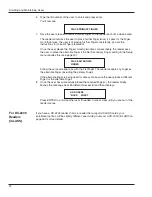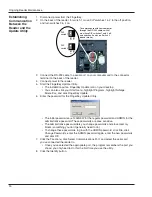
HandKey II Manual
15
Designing a User ID Numbering System
You don’t need to design an ID numbering system if you use a card reader to supply the
ID number. The card provides all ID information.
User ID numbers tell the reader which user is trying to gain access.
A well-designed ID number system makes it quicker for you to decide which ID to assign
to a new user, and it makes ID entry faster at the reader through the use of the Set ID
Length command (see page 41).
Follow these guidelines when designing an ID numbering system:
• Each user must have a unique ID number; the reader won’t accept two people with the
same ID. (If you enroll people using the last four digits of their phone numbers or social
security numbers, you may get duplicate numbers.)
• ID numbers may begin with 0 (zero). For example, the reader regards the ID 05 as
different from the ID 5.
• ID numbers can be up to 15 digits long when entered at the reader keypad, but shorter
numbers are easier to remember and easier to enter. (The reader gives you about 10
seconds to enter an ID number.) In most contexts, 4-digit numbers provide adequate
security and are easy to remember and enter.
• Make all ID numbers the same length. This lets you use the Set ID Length command.
If you don’t use the Set ID Length command, users must enter their ID and then press
the enter key; if you use the Set ID Length command, users only have to enter the
ID without needing to press enter; the reader automatically continues as soon as the
appropriate number of digits are entered; see page 41 for more about this command.
If a Card
Reader
Identifies Users
If Users Must
Type Their ID
Numbers on
the Reader
Keypad
















































